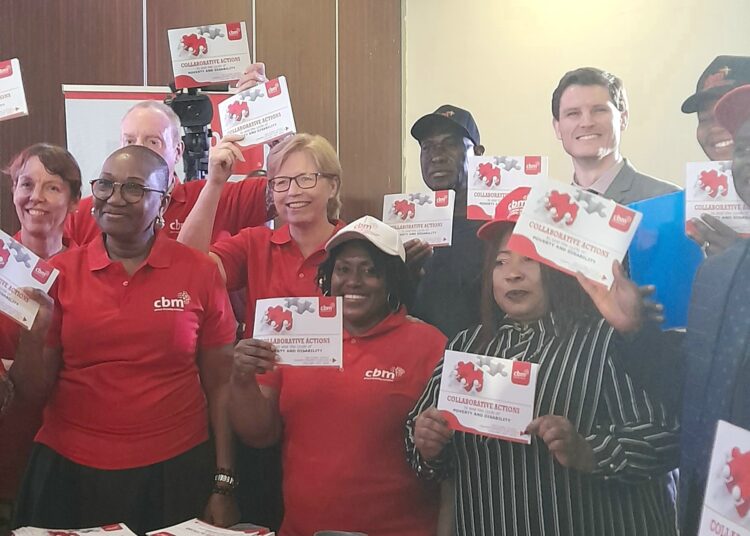Toward ending the cycle of poverty and disability in Nigeria, CBM Global Disability Inclusion Nigeria has launched its Country Strategy Plan (CSP) to promote and protect the rights of persons with disabilities in the country.
The strategy with the theme “Collaborative Actions To End The Cycle Of Poverty & Disability (COLLABO: 2023-2026), took place in Abuja on Wednesday, July 12, 2023.
The strategy was aimed at broadening stakeholders’ understanding of the strategic direction of CBM Global Nigeria, its goal, objectives and result areas, and also, to draw improved understanding of the UNCRPD, SDGs, Accessibility GO, and pertinence to driving the disability agenda in Nigeria.
The CSP seeks to respond to existing gaps in the country that negate the rights of persons with disabilities, hindering their ability to achieve their full potential in life.
Speaking at the event, the Country Director of CBM Global Nigeria, Ms. Ekaete Umoh, in her opening remarks, expressed delight to celebrate the CBM Global Nigeria CSP launch.
She invited stakeholders to join efforts through collaborative actions to end the cycle of poverty and disability in Nigeria through this three-year framework.
Furthermore, Ms. Ekaete said that Nigeria, since independence has been faced (and still faces) huge challenges that have affected its growth and development. “Despite abundance in mineral and human capital development resources, the country has been unable to translate these potentials and opportunities into inclusive growth.
“It is true that persons with disabilities are mostly affected and constitute majority of Nigeria’s poor. Data from the National Population Commission puts the total number of persons with disabilities in Nigeria at an estimated 19 million, and this puts the percentage of people with disabilities at 9.6 per cent approximately.
“Now more than ever before, the importance of this CSP launch is timely and comes at a critical juncture in the life of the organization where it has an opportunity to present itself as an effective gateway through which persons with disabilities can be mobilized and reached with programs, projects and services.
She further said, “As we are gathered here today to launch the “Collabo” Country Strategy Plan, we enjoin CBM Global Nigeria stakeholders present at the event to take positive steps and take up the mantle of leadership in responding to these existing gaps that continue to negate the rights of persons with disabilities, hinder their ability to live a life of dignity and achieve their full potential.”
Also speaking, the CEO of CBM UK, Kirsty Smith, who was represented by Program Coordinator at CBM UK, Frank Abu, expressed pleasure in the launch of the CSP, commending CBM Global Nigeria and stakeholders for their collaboration.
“It is important to highlight that CBM UK, is one of the 6-member association of CBM Global Disability Inclusion Federation tasked with working alongside people with disabilities in the world’s poorest places to transform lives and build inclusive communities where everyone can enjoy their human rights and achieve their full potential through our vision of an inclusive world in which all people with disabilities enjoy their human rights and achieve their full potential.”
The event also featured a panel discussion tagged; Disability 101: What Really Is Disability? The series x-rayed the human rights based approach to disability inclusion, which was moderated by Sulayman Ujah with Barr. Mary Musa, Lawrence Idemudia, Constance Onyemaechi, and Kyauta Giwa as panellists.
Speaking on what disability is, a panelist from Women and Girls With Albinism Network, Constance Onyemaechi said that simply having an impairment does not mean a person is disabled, but that when that impairment interacts with society that impedes equal and effective participation is when it is termed a disability.
She, however, called for the full implementation of the Discrimation against persons with disabilities (Prohibition) Act to address the persistent discrimination against people with disability in Nigeria.
Another panellist, Kyauta Giwa, called for strategic and consistent advocacy for people with disabilities, stressing that there is a need to institutionalize the way to work with them.
“In engaging persons with disabilities, meeting venues should be inclusive of them. There is also a need for their inclusion in program design, proposal writing, and other activities. Also, ensure their representation in the strategic management process to know how to work with them. They should be carried along. Also, enlightenment campaigns should be carried out to reduce discrimination and promote equality at all levels,” she added.






